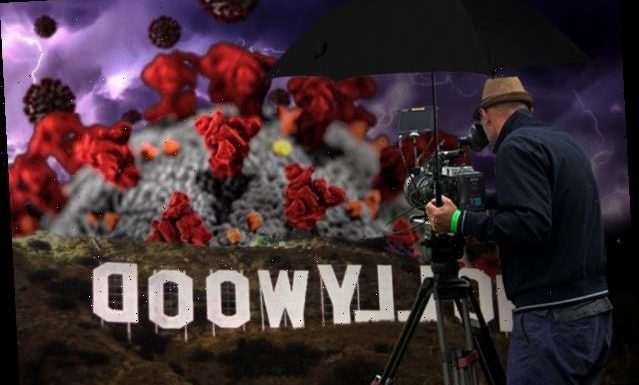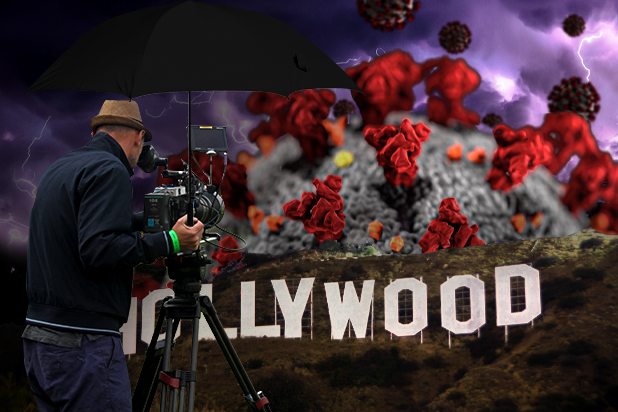
“Federal legislation is needed to get American workers meaningfully back to work on film, television and sports productions,” the letter reads
A coalition of film, television and sports production organizations has written a letter to Senate leadership asking the group to address the “severe damage to our families, workforce and economy” caused by the pandemic and the industry shutdown that followed and for the addition of pandemic risk coverage.
The coalition — which includes the Motion Picture Association (MPA,) Independent Film & Television Alliance, Nascar, NCTA Internet and Television Assn., the NFL, the Directors Guild, the National Association of Broadcasters, IATSE, the Producers Guild (PGA), ACICP and SAG-AFTRA — is addressed to members of the Senate Committee on Banking, Housing and Urban Affairs, including Charles Schumer, Sherrod Brown, Mitch McConnell, and Patrick J. Toomey.
“The lack of business insurance coverage for coronavirus pandemic losses is at a critical issue for the economy at large, but it is a threshhold issue for the continued operation of our industries. Simply put, it is enormously challenging for us to go back to work absent pandemic insurance coverage,” the Feb. 19 letter reads. “Federal legislation is needed to get American workers meaningfully back to work on films, television and sports productions.”
More than 2.5 million jobs are created in the film, television and streaming industries across the country each year, many which came to a screeching halt last March due of the COVID-19 pandemic and have had difficult restarting because of the inability to secure insurance “against the risk of losses resulting from shutdowns or illnesses of key cast members.”
“Without federal protection against these unprecedented risks, private banks are unable to justify financing many independent film productions and some major studios will not risk investment in high budget, large cast productions,” the letter goes on to say. “The job loss numbers suffered in these impacted industries since March have been staggering. The pandemic has impacted 464,000 film and television jobs in the United States to date. Roughly 400 film and television productions were canceled last year. The need for federal assistance is urgent and intensifies by the day.”
The letter represents the second time the group has reached out to Washington about the insurance issue, saying that since the mid-March 2020 pandemic shutdowns, many companies have been unable to get pandemic risk coverage.
On Nov. 18, the coalition issued a letter to members of the House Financial Series committee, including Maxine Waters, William Lacy Clay, Patrick McHenry and Steve Stivers. The more recent letter was sent to a different part of Congress and support from both committees is needed to move forward.
While Friday’s letter is in hopes of starting a dialogue with the Senate leaders in the new administration and to encourage them to understand the issues and move it forward on their agenda, the November 2020 letter was to the House of Representatives in advance of their Nov. 19 hearing on “Insuring Against a Pandemic: Challenges and Solutions for Policyholders and Insurers,” which was to re-emphasize the need for their support and show appreciation for the PRIA Bill the House introduced into Congress in June.
Read the letter in full below:
Dear Majority Leader Schumer, Minority Leader McConnell, Chairman Brown, and Ranking Member Toomey:
We thank you for your leadership addressing the severe damage caused to our families, workforce, and economy by the coronavirus pandemic.
As you develop the agenda for the Senate Committee on Banking, Housing, and Urban Affairs for this year, the film, TV, and sports industries respectfully request that you address the broad economic impact that the withdrawal of pandemic risk coverage has created for our businesses. The lack of business insurance coverage for coronavirus pandemic losses is a critical issue for the economy at large, but it is a threshold issue for the continued operation of our industries. Simply put, it is enormously challenging for us to go back to work absent pandemic insurance coverage. Federal legislation is needed to get American workers meaningfully back to work on films, television, and sports productions.
The film, television, and streaming industries provide 2.5 million jobs across the 50 states, including hundreds of thousands of small businesses with annual wages of more than $200 billion. Productions were brought to an abrupt halt last March due to the COVID-19 pandemic. Our industries, especially independent film producers, have struggled to restart productions due to our inability to secure insurance against the risk of losses resulting from shutdowns or illnesses of key cast members. Without federal protection against these unprecedented risks, private banks are unable to justify financing many independent film productions and some major studios will not risk investment in high budget, large cast productions. The job loss numbers suffered in these impacted industries since March have been staggering. The pandemic has impacted 464,000 film and television jobs in the United States to date. Roughly 400 film and television productions were canceled last year. The need for federal assistance is urgent and intensifies by the day.
Prior to March 2020, specialty insurance companies that write insurance for our industries would generally provide pandemic risk insurance. However, since March, many productions are unable to obtain the insurance coverage necessary to protect filming from shutting down abruptly or being cancelled entirely as a result of COVID-related incidents. Pandemic endorsements are now excluded from insurance policies. Without a “clean” insurance policy, a content producer’s ability to obtain financing or to access the capital necessary to commence production is severely complicated or impossible. It is critical that the federal government step in immediately and fill this essential gap, giving confidence to producers and investors so our industry and others can resume operations and restore jobs.
A long-term public-private partnership on pandemic risk insurance is needed to stabilize financing and employment. The Terrorism Risk Insurance Act of 2002 (P.L.107-297) was originally enacted following the September 11, 2001 terrorist attacks and was reauthorized again last Congress to provide a federal backstop for terrorist risk insurance. Congress needs to create a similar solution tailored to disease pandemics.
In the near term, however, our industry needs direct intervention by the federal government to jump start production throughout the United States, through temporary, targeted federal funds that provide the necessary guarantees of loss coverage so that productions can go forward. Such programs now exist in other countries. Providing this protection for productions now would get our U.S. industry back to work at a critical time and would ensure diversity of content in the months to come.
We urge you to hold a hearing to review the need for pandemic risk coverage in the Senate Committee on Banking, Housing, and Urban Affairs. We appreciate the actions Congress took last year to help address the myriad of health and economic issues stemming from the pandemic. In that spirit, we also urge Congress to act quickly to help “bridge” the current coverage gap while a more long-term solution can be negotiated between policymakers and the insurance industry. Inclusion of legislation in the next COVID relief package that helps solve this pressing economic problem would have a tremendous impact in creating jobs that will restore the health of the American economy.
Thank you for your consideration. We are ready to work with you on this effort.
Sincerely,
MotionPictureAssociation IndependentFilm&TelevisionAlliance
NASCAR
NCTA–TheInternet&TelevisionAssociation
NationalFootballLeague DirectorsGuildofAmerica NationalAssociationofBroadcasters
InternationalAllianceofTheatricalStageEmployees
ProducersGuildofAmerica AmericanCoalitionforIndependentContentProduction ScreenActorsGuild–AmericanFederationofTelevisionandRadioArtists
Source: Read Full Article
